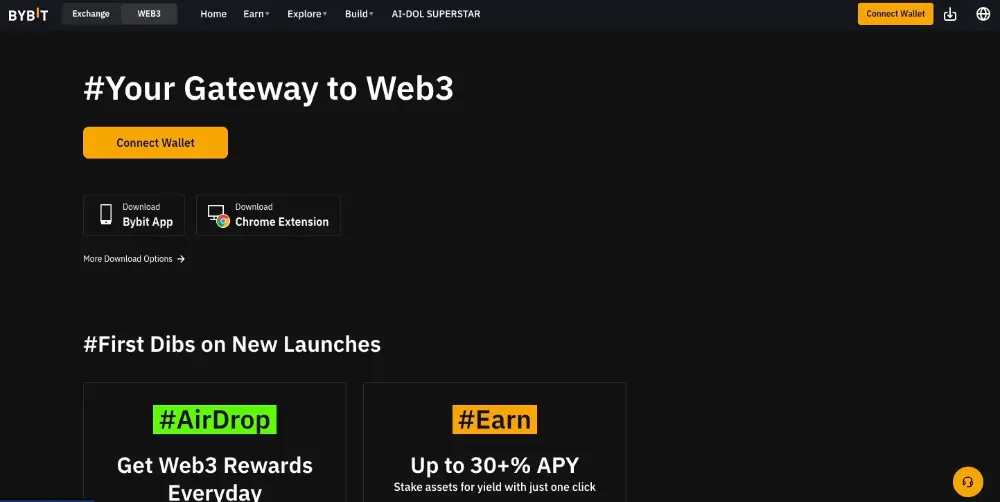Top 10 Secure Bitcoin & DeFi Wallets
Cryptocurrency is a high-risk asset class, and investing carries significant risk, including the potential loss of some or all of your investment. The information on this website is provided for informational and educational purposes only and does not constitute financial, investment, or trading advice. For more details, please read our editorial policy.
Disclosure
We may earn commissions from affiliate links or include sponsored content, clearly labeled as such. These partnerships do not influence our editorial independence or the accuracy of our reporting. By continuing to use the site you agree to our terms and conditions and privacy policy.
Crypto ownership is growing fast – but so are the risks. Whether you’re a long-term HODLer, a DeFi degenerate, or just trying to store your Bitcoin safely, choosing the right crypto wallet could make or break your portfolio. The best crypto wallets in 2025 offer not just security, but flexibility, low fees, and multi-chain support.
From sleek mobile apps to rugged cold wallets, this guide ranks the top 10 wallets that balance usability and security.
But which one fits your bill? Let’s find out together
Top Crypto Wallets in 2025 Ranked
Here are the 10 best crypto wallets to use in July 2025:
- Best Wallet – Best mobile self-custody wallet for swaps, staking & low fees
- Ledger Stax – Premium hardware wallet with curved E-Ink screen and wireless charging
- ELLIPAL Titan 2.0 – Air-gapped hardware wallet with QR-only transactions
- Trezor Safe 5 – Flagship Trezor model with open-source firmware and haptic feedback
- Cypherock X1 – Seedless cold wallet with inheritance features
- SafePal – Budget cold wallet with great DeFi integrations
- Keystone – Open-source multisig wallet with secure QR signing
- ByBit Wallet – Best for traders wanting wallet + exchange in one
- Zengo – Most beginner-friendly wallet with keyless recovery
- Gate.io Wallet – Top wallet for trading & DeFi across 1,000+ coins
How We Ranked The Best Crypto Wallets
Picking a crypto wallet isn’t just about brand recognition. We used a mix of security, usability, coin support, and cost to rank the best wallets of 2025.
Here’s what we looked at:
- Security Features: Cold storage? 2FA? Air-gapped? Private keys offline?
- Supported Cryptos: Multi-chain support including BTC, ETH, BNB, SOL, etc.
- User-Friendly Features: Ease of setup, UI/UX, and mobile convenience
- Integrated Tools: Swaps, staking, NFTs, DApp browser, fiat on-ramps
- Transaction Fees: Transaction and swap fees, if applicable
- Recovery Options: Backup phrase, biometrics, or seedless recovery
- Audit Status: Open-source or third-party security audit (e.g. Keylabs)
Overview of The Best Bitcoin Wallets
Each wallet solution serves different needs depending on your trading style, portfolio size, and security priorities.
1. Best Wallet – Mobile-First DeFi Champion
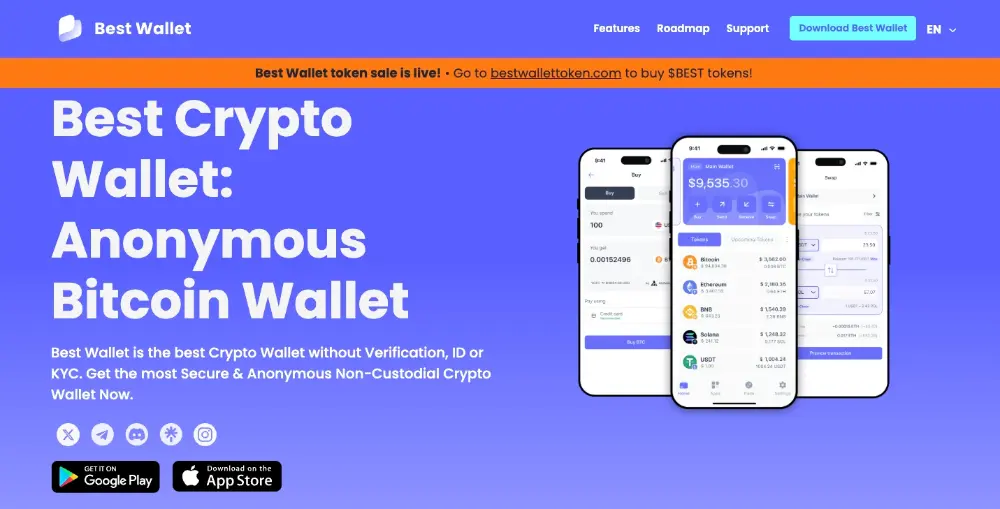
Best Wallet dominates the mobile space with its intuitive interface and powerful DeFi integration. The app supports Bitcoin, Ethereum, Polygon, and BNB Chain with plans to open up Solana as well – particularly good for Solana meme coins if you’re hunting for those 1000x moonshots.
Security features include biometric authentication, multi-factor verification, and encrypted backup passphrases. The built-in DEX aggregator lets you swap tokens without leaving the app, which means fewer chances for a rug pull when moving between platforms.
Web3 integration connects seamlessly with major DeFi protocols, NFT marketplaces, and decentralized exchanges.
Custom token support means you can add any ERC-20, BEP-20, or Polygon token by pasting the contract address – perfect for sniping those early presale gems.
The fiat onramp enables direct crypto purchases with debit cards, while zero-fee swaps and no storage charges make it cost-effective for active traders. Just remember, even the slickest mobile wallet won’t save you from your own FOMO – always DYOR before aping into anything.
| Wallet Type | Supported Cryptos | Mobile App | Special Features |
| Software (Hot) | Ethereum, BNB Chain, Polygon tokens | Yes | DEX aggregator, fiat onramp, Web3 integration |
2. Ledger Stax – Premium Hardware Excellence
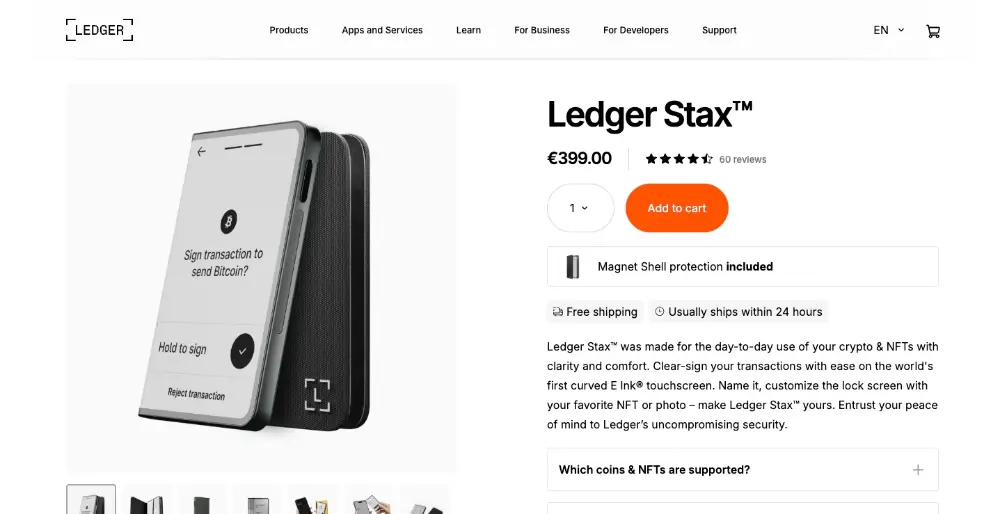
Ledger Stax is Ledger’s most advanced wallet yet, rocking a futuristic curved E-Ink touchscreen and wireless charging. Think of it as the Tesla of crypto wallets – premium price, premium features.
You get full support for 5,500+ assets (including NFTs), a slick customizable home screen, and the kind of security you’d expect from Ledger’s EAL6+ chip. The device literally displays your favorite NFT on the lock screen, which is either cool or cringe depending on your tolerance for flexing.
Bluetooth and USB-C let you sync with Ledger Live on mobile or desktop, while the credit-card-sized, stackable design keeps it travel-friendly. The wireless charging is surprisingly handy when you’re managing multiple wallets.
You’ll pay a premium (around $399), but if you want a cold wallet that actually feels fun to use, this is it. Stack ’em, show off your CryptoPunks, and keep your keys air-gapped from start to finish.
Remember though – no hardware wallet can protect you from signing malicious transactions, so stay alert.
| Wallet Type | Supported Cryptos | Mobile App | Special Features |
| Hardware (Cold) | 5,500+ cryptocurrencies, NFTs | Yes | Touchscreen, Bluetooth, wireless charging, stackable design, customizable NFT lock screen, Ledger Recover |
3. ELLIPAL Titan 2.0 – Air-Gapped Security Fortress
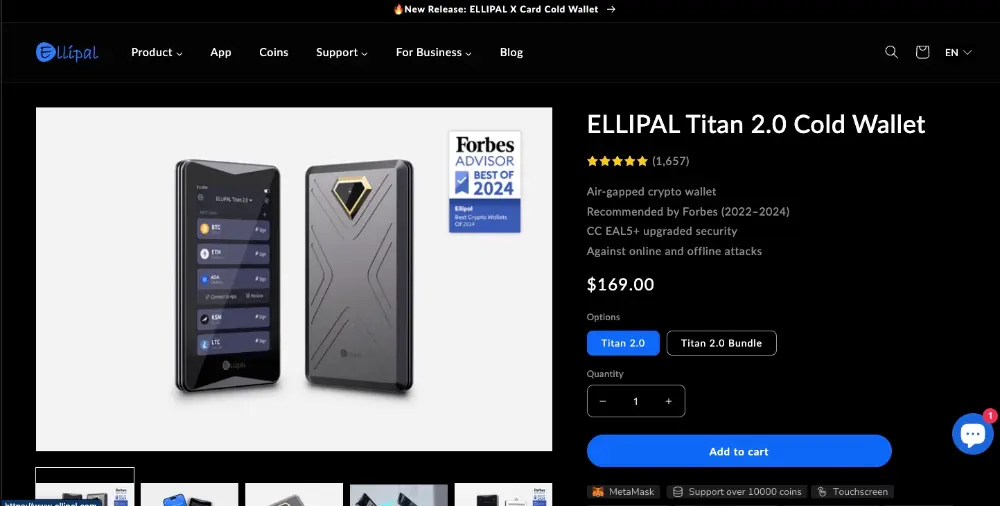
ELLIPAL Titan 2.0 takes security to the extreme with complete air-gap isolation – no WiFi, Bluetooth, or USB connections ever. All transactions use QR code signing between the device and mobile app, making it virtually impossible for hackers to reach your funds remotely.
The anti-tamper design permanently destroys the device if physical security is compromised – basically a self-destruct mechanism for your crypto. Supporting 40+ blockchains and 10,000+ tokens including Bitcoin, Ethereum, and Solana means you won’t run into compatibility issues.
The large touchscreen provides intuitive navigation and transaction confirmation, while the built-in camera enables QR code scanning for secure transaction signing. It’s like having a mini smartphone dedicated purely to crypto security.
Mobile app integration handles portfolio management, token swaps, and DeFi connections without compromising the cold storage security. At $169, it offers institutional-grade security for long-term holders who want that extra peace of mind. Just don’t expect lightning-fast transactions – security comes with a slight convenience trade-off.
| Wallet Type | Supported Cryptos | Mobile App | Special Features |
| Hardware (Cold) | 10,000+ tokens across 40+ chains | Yes | Air-gapped, QR signing, anti-tamper design |
4. Keystone – Open-Source Multisig Champion
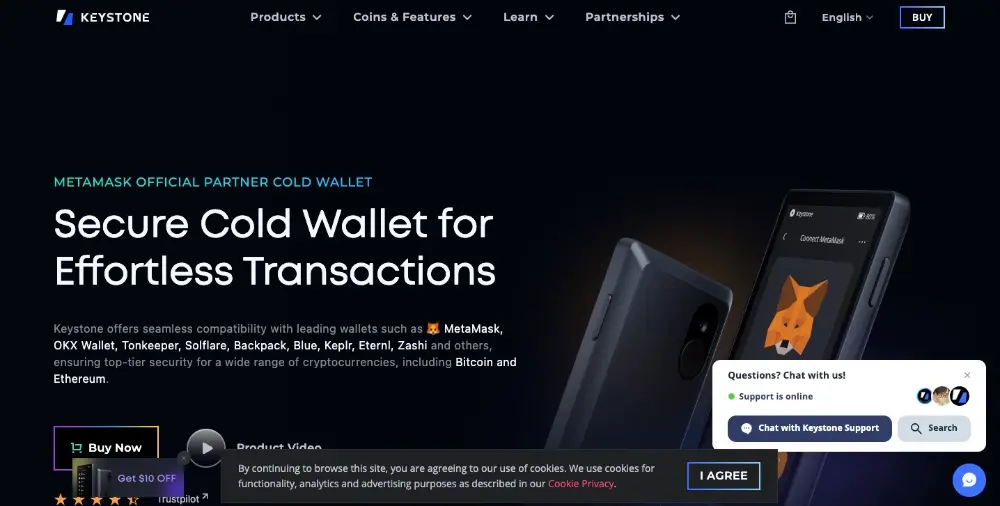
Keystone prioritizes transparency with fully open-source firmware that’s community-audited and GitHub-verified.
You can access 5,500+ tokens across Bitcoin, Ethereum, Solana, and other major networks, as it’s built for users who want to verify every line of code protecting their funds.
Multisig compatibility makes it ideal for teams and high-value holders requiring multiple signatures for transactions. QR code signing maintains air-gap security without any wireless connections – pure paranoia in the best possible way.
The large touchscreen and microSD support enable firmware updates and encrypted backups, while integration with MetaMask, Rabby, and other popular wallet interfaces keeps it compatible with your existing workflow.
Pricing ranges from $120-$170 depending on the model, and it’s best suited for advanced users who value code transparency and multisig functionality. If you’re the type who reads smart contracts before signing, Keystone speaks your language.
| Wallet Type | Supported Cryptos | Mobile App | Special Features |
| Hardware (Cold) | 5,500+ tokens | No | Open-source, multisig, microSD backups |
5. SafePal – Budget Hardware Champion

SafePal delivers hardware-grade security at entry-level pricing around $50-$70, making it the gateway for users upgrading from hot wallets. When you consider the over 10,000 tokens across 100+ networks including Bitcoin, Ethereum, Solana, and Arbitrum, it becomes a very hot prospect.
QR code signing maintains air-gap security without Bluetooth or USB connectivity, while the EAL5+ secure element chip protects against tampering and malware attacks. The self-destruct mechanism wipes data if physical breach is detected – budget price, premium paranoia.
The mobile app enables DeFi access, staking, and decentralized exchange connections with roughly 1% swap fees through integrated DEX services. Manual firmware updates via microSD can be inconvenient, but the price-to-feature ratio is unbeatable.
It’s a great wallet for beginners who want to test cold storage without breaking the bank, or experienced users who need a backup device. Just remember – even the best hardware wallet won’t save you from social engineering attacks or malicious dApps.
| Wallet Type | Supported Cryptos | Mobile App | Special Features |
| Hardware (Cold) | 10,000+ tokens across 100+ chains | Yes | Self-destruct, QR signing, budget-friendly |
6. Cypherock – Seedless Innovation

Cypherock eliminates single points of failure with Shamir Secret Sharing technology that splits private keys across four X1 cards and a vault. No seed phrases required – just a revolutionary approach to crypto security that feels like something out of a spy movie.
It supports 3,000+ cryptocurrencies including Bitcoin, Ethereum, and ERC-20 tokens and comes with built-in multi-factor authentication and open-source, security-audited firmware. The system is designed so even losing one card doesn’t compromise security – you only need one card plus the vault.
The non-custodial inheritance features let you assign nominees and set inactivity triggers, making it perfect for long-term wealth planning. PIN recovery service and real-time asset tracking round out the feature set.
It’s perfect for investors planning long-term wealth transfer or anyone who’s paranoid about losing a traditional seed phrase. The learning curve is steeper than traditional wallets, but the security benefits are substantial. Think of it as crypto insurance for your crypto insurance.
| Wallet Type | Supported Cryptos | Mobile App | Special Features |
| Hardware (Cold) | 3,000+ cryptocurrencies | No | Seedless, inheritance, Shamir Secret Sharing |
7. Binance Wallet – Exchange Integration King
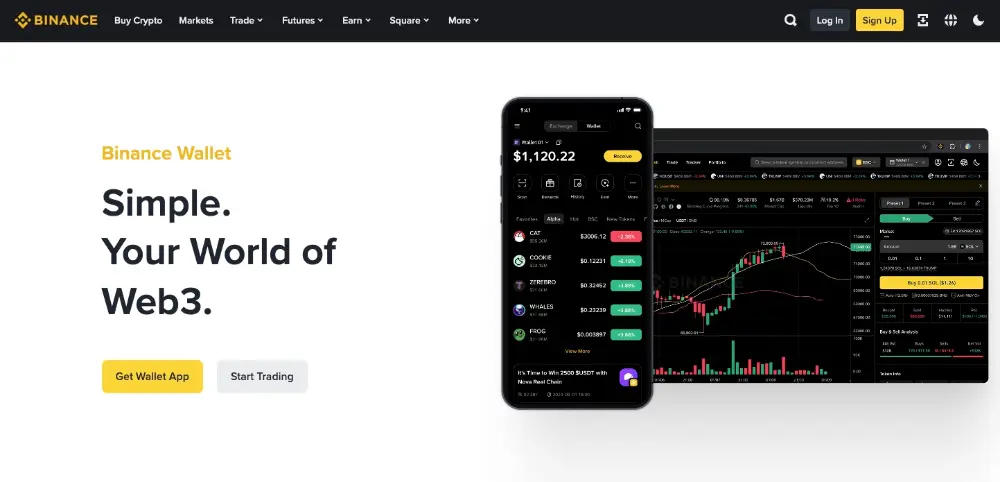
Binance Wallet seamlessly connects with the entire Binance ecosystem for unified trading and DeFi access. Available as web extension, mobile app, and desktop versions, it’s basically the Swiss Army knife of crypto wallets if you’re already deep in the Binance universe.
Multi-signature technology and 2FA provide enterprise-grade security, while supporting all major cryptocurrencies across Ethereum, BNB Chain, Bitcoin, and emerging networks. The real magic happens with DeFi integration – dApp connections, NFT management, and yield farming all flow through one interface.
In-app trading leverages Binance’s massive liquidity pools for optimal pricing, which means tighter spreads when you’re swapping or trading. Cross-device syncing ensures seamless access anywhere, though KYC requirements and centralized integration may not appeal to pure decentralization advocates.
It’s the go-to option for traders who live on Binance and want everything connected, but remember – you’re still playing in a walled garden. The convenience is undeniable, but so is the platform risk if Binance ever faces regulatory issues or technical problems.
| Wallet Type | Supported Cryptos | Mobile App | Special Features |
| Software (Hot) | All major cryptocurrencies | Yes | Exchange integration, multi-signature, cross-device sync |
8. ByBit Wallet – Derivatives Trader’s Edge
ByBit Wallet caters specifically to active traders and derivatives specialists with direct platform integration. Supported cryptocurrencies include Bitcoin, Ethereum, USDT, and other major trading pairs that matter for leveraged positions.
Advanced security combines multi-signature wallets, 2FA, and cold storage for institutional-grade protection, while built-in swapping leverages ByBit’s liquidity for competitive rates. The interface balances professional trading tools with user-friendly design.
Staking and yield farming features enable passive income generation between trades, while seamless derivatives trading access makes position management effortless. KYC requirements apply for full functionality access – the price of playing in regulated sandboxes.
What we can say is that it’s perfect for traders who live and breathe perpetual futures, but the wallet is probably overkill if you’re just buying and holding. The integration with ByBit’s ecosystem is smooth, but remember – centralized platforms can freeze accounts or restrict withdrawals during extreme market conditions.
| Wallet Type | Supported Cryptos | Mobile App | Special Features |
| Software (Hot) | Bitcoin, Ethereum, USDT, major altcoins | Yes | Derivatives integration, advanced trading, yield farming |
9. ZenGo – Keyless MPC Innovation
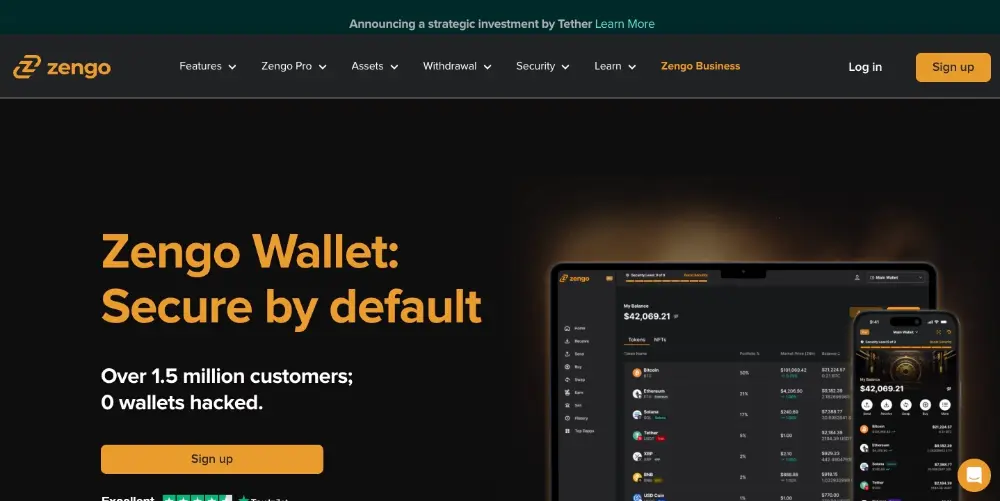
ZenGo revolutionizes wallet security with multiparty computation (MPC) technology that eliminates traditional private keys. Instead, credentials are split across multiple secure servers using mathematical wizardry that would make cryptographers weep with joy.
Facial biometric authentication provides convenient yet secure access, while supporting Bitcoin, Ethereum, BNB Chain, and Dogecoin with built-in swapping capabilities. The 0.5% swap fees are competitive, and the company claims zero security breaches to date.
Recovery uses multi-factor authentication across email, biometrics, and cloud storage – no seed phrases to lose or forget.
The user-friendly interface makes it perfect for crypto newcomers who find traditional wallets intimidating.
Available free on Android and iOS, it’s ideal for users who want security without complexity. The trade-off is trusting ZenGo’s servers and technology – innovative but not as battle-tested as traditional approaches. Perfect for beginners, but purists might prefer full self-custody.
| Wallet Type | Supported Cryptos | Mobile App | Special Features |
| Software (Hot) | Bitcoin, Ethereum, BNB Chain, Dogecoin | Yes | Keyless MPC, biometric auth, no seed phrases |
10. Gate.io Wallet – DeFi Diversity Champion
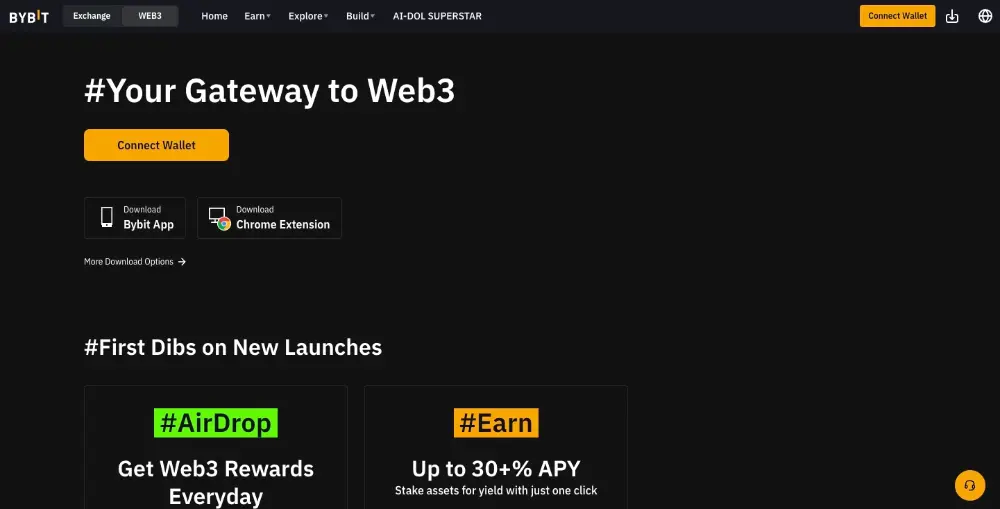
Gate.io Wallet supports an impressive 1,400+ cryptocurrencies, making it one of the most diverse options available for traders hunting obscure altcoins and emerging projects.
The DeFi protocol integration enables yield farming and staking across multiple chains, and advanced security features include multi-factor authentication, private key encryption, and cold storage integration. The Proof of Reserves system enhances transparency – though skeptics note this doesn’t guarantee much in worst-case scenarios.
Cross-platform availability spans mobile, desktop, and browser extension, while in-app trading with low fees plus staking rewards create opportunities for passive income. The user-friendly design accommodates both beginners and advanced traders.
Gate’s Wallet is perfect for diversified portfolios spanning major and minor cryptocurrencies, though the DeFi complexity might overwhelm newcomers initially. The massive coin support means you’ll rarely encounter compatibility issues, but with great power comes great responsibility – more options mean more ways to lose money.
| Wallet Type | Supported Cryptos | Mobile App | Special Features |
| Software (Hot) | 1,400+ cryptocurrencies | Yes | Massive asset support, DeFi integration, Proof of Reserves |
Hot Wallet vs Cold Wallet: Key Differences
When choosing between a hot wallet and a cold wallet, the main difference comes down to connectivity. Hot wallets are always connected to the internet. This alone makes them convenient for daily transactions, trading, and DeFi access – but also exposes them to higher risks like malware, phishing, or unauthorized access.
Cold wallets, on the other hand, store your private keys completely offline. They’re often hardware devices that only sign transactions when physically connected. While cold storage offers stronger protection against online threats, it’s less user-friendly for everyday use.
If you’re actively trading, yield farming, or buying NFTs, a hot wallet like Best Wallet or Zengo makes sense. But if you’re sitting on a sizable bag of BTC or ETH, it’s smart to keep most of that stash in cold storage, like a Ledger Flex or Trezor Safe 5.
For optimal security and usability, many investors use both types: a hot wallet for spending and a cold wallet for storing.
| Feature | Hot Wallet | Cold Wallet |
| Internet Connection | Always online | Offline until needed |
| Security Risk | Higher (vulnerable to hacks) | Very low (air-gapped or encrypted) |
| Ideal For | Daily use, trading, DeFi | Long-term storage, large amounts |
| Examples | Best Wallet, Zengo, Trust Wallet | Ledger Flex, Trezor Safe 5, Cypherock |
| Accessibility | Immediate | Requires physical access |
| Recovery | Often via seed phrase or biometrics | Seed phrase, QR signing, secure chips |
Cryptocurrency Wallets For Beginners: What’s The Difference?
If you’re just entering the crypto space, choosing between different cryptocurrency wallets can feel overwhelming. But understanding the basics – like how wallets work and which type suits your goals – can make a huge difference in keeping your funds safe, even before you invested your first $1 in a crypto presale or an established altcoin.
A crypto wallet is simply a tool that lets you store, send, and receive digital assets like Bitcoin or Ethereum. There are two main types: hot wallets (software wallets) and cold wallets (hardware wallets). Hot wallets – such as Best Wallet or Trust Wallet – run on mobile devices or desktops and are ideal for fast, everyday crypto transactions.
Cold wallets like Ledger or Trezor are physical devices. They’re more secure, but not as convenient for users who regularly swap crypto or interact with crypto exchanges and dApps.
Here’s what beginners should look for:
- A user-friendly interface (clean dashboard, simple navigation)
- Two-factor authentication for added security
- Backup options like seed phrases or biometric recovery
- Built-in features like in-app swaps or fiat purchases
If you’re planning to use DeFi apps, consider a self-custody wallet like Best Wallet that lets you retain full control of your private keys while remaining connected to the blockchain.
What Are Hardware Wallets?
Hardware wallets are physical devices used to store your private keys completely offline. Because they’re not connected to the internet, they protect your funds from online threats like malware and phishing attempts. These wallets are ideal for long-term holders storing large amounts of crypto. Popular options include Ledger Nano, Trezor Safe 5, and Cypherock X1. To send crypto, you connect the device, approve the transaction manually, and sign it on-screen. The setup ensures your private keys remain offline at all times.
What Are Software Wallets?
Software wallets, also called hot wallets, are applications that run on your mobile devices or desktop. These wallets are always online, which makes them great for quick crypto transactions, swaps, and interacting with decentralized apps. Examples include Best Wallet, Zengo, and Trust Wallet. They’re easy to use and support most crypto assets across multiple blockchains. However, since they’re connected to the internet, they’re more exposed to potential online threats, so features like two-factor authentication are essential for protection.
Self-Custody vs Custodial Wallets
When you have to manage your money in crypto, the choice between self-custody and custodial wallets is huge. A custodial wallet, like those offered by centralized exchanges, holds your private keys for you. It’s convenient – you can trade or receive Bitcoin easily – but you’re trusting a third party to protect your assets.
In contrast, a self-custody wallet like Best Wallet or Ledger gives you full control over your funds. You hold the keys, you sign the transactions, and only you can access the coins. It’s ideal if you want to invest directly into crypto and care about owning your wealth outright.
If you’re serious about investing, self-custody puts the responsibility – and the power – fully in your hands.
| Feature | Self-Custody Wallets | Custodial Wallets |
| Who Holds the Keys? | You | The third-party service/exchange |
| Control Over Assets | Full | Limited (you can lose access) |
| Risk of Losing Funds | Higher if keys are lost | Higher if provider is compromised |
| Ability to Invest Directly | Yes | Often limited |
| Access to DApps/DeFi | Yes | Usually restricted |
| Basic Features | Send, receive, swap, stake | Trade, deposit, withdraw |
Are Crypto Exchanges Linked to Crypto Wallets?
Yes – but it depends on the setup. Most centralized crypto exchanges like Binance or Coinbase come with built-in custodial wallets. These wallets hold your assets for you, but the platform controls the private keys – meaning you don’t truly own the funds. If the exchange is hacked or freezes withdrawals (remember FTX?), your coins could be at risk.
That’s why many users transfer assets to a self-custody wallet after buying on an exchange. For example, you might buy ETH on an exchange and send it to mobile wallets like Best Wallet to keep control. Some wallets, like Gate.io Wallet, integrate directly with exchanges, allowing users to trade while maintaining greater control.
Just remember: Not your keys, not your coins.
How to Create a Crypto Wallet
Getting started with Best Wallet takes just a few minutes, but following proper security measures is crucial for protecting your funds.
Step 1: Download Best Wallet App
Visit the official Best Wallet website and download the mobile app for your device. Available for both Android and iOS through official app stores only.
Verify the developer name matches exactly to avoid fake apps. Check download numbers and reviews for additional validation.
Step 2: Create New Wallet
Open the app and select “Create New Wallet.” Choose a strong PIN that you’ll remember but others can’t guess easily.
Enable biometric authentication (fingerprint or Face ID) for convenient yet secure access. Set up two-factor authentication using your mobile number.
Step 3: Secure Your Seed Phrase
Write down the 12-word backup phrase on paper using a pen (not pencil). Store this in a secure location like a safe or safety deposit box to protect your crypto storage.
Never take photos or store digitally. Confirm the phrase by entering it back into the app to verify accuracy.
Step 4: Fund Your Wallet
Transfer cryptocurrency to your new wallet address or use the built-in fiat onramp to buy directly with a debit card.
Start with small amounts to test the process before transferring larger holdings. Double-check addresses before sending any funds.
Step 5: Explore Features
Connect to DeFi protocols, swap tokens using the integrated DEX, or explore NFT marketplaces. Always start small when trading cryptocurrencies.
Final words
Crypto wallets are e your gateway to trading with digital assets, decentralized applications, online gambling, and financial sovereignty. Don’t let past performance or brand names be your only guide.
Instead, focus on security features, user control, and supported networks. And remember: always back up your recovery phrase, stay alert to scams, and only invest what you’re willing to lose.
In crypto, control is power – but responsibility is yours.
